- Home
- Jan-Philipp Sendker
The Language of Solitude Page 7
The Language of Solitude Read online
Page 7
“A little,” Yin-Yin said, smiling briefly. “He plays the harmonica very well. The musical talent really comes from my mother. She’s a music teacher and would have liked to be a singer. She had a beautiful voice.”
“Had? Is she dead?” Christine asked, as horrified as though she was asking after a good friend of hers.
“No.” Yin-Yin took a couple of deep breaths before she continued. “But she no longer sings.”
Silence.
“You’re not an only child, are you?” Paul asked. He didn’t want to let the conversation die away.
“No. I have an older brother.”
“What does he do?”
“He lives in Shanghai too, and is a manager with China Life, the insurance company.”
“Will we get to meet him?”
“I don’t think so.”
Christine started. A harsh note had entered Yin-Yin’s voice, which had been friendly up to that point.
Silence filled the car again. A big ugly silence that was born of speechlessness, not of wordless rapport, which Paul and Christine shared.
Christine leaned back and looked out the window. Even though the car was traveling fast, she had the feeling that it was barely moving. The city looked the same everywhere: high-rise building next to high-rise building like trees in a forest, broken up only by cranes and construction sites on which new tower blocks were being built. After a while, the number of tall buildings decreased and the number of construction sites increased.
When the first few paddy fields appeared, they had been traveling in the car for almost two hours. The expressway now snaked through a hilly gray-green landscape, dotted with railroad embankments, newly built highways, and bridges. It was a strange area, no longer the city, but also not the countryside. She saw blocks of housing that had clearly been finished, but seemed empty. She saw half-finished buildings, shells that were already starting to fall apart. Wide roads that suddenly came to an end. Bridge posts without the bridges. As far as she could tell, many of the towns that they passed consisted mainly of factories and the workers’ housing. Was this the face of the new China that she had read and heard about so much in Hong Kong?
Not beautiful.
Not ugly.
A densely populated but at the same time faceless, repellent landscape.
“We’ll be there in around an hour. My parents live in a village near Yiwu. Do you know it?” Yin-Yin asked.
“No,” Paul replied.
“We’ve booked a hotel room there for you. It’s an interesting place.”
“How so?”
“When we moved there twenty years ago it was a small town with thirty thousand inhabitants, but now almost seven hundred thousand people live there. I went to school there, but now I’m always getting lost in the city. A friend of mine went to America for three years and when he came back recently he could no longer find his home. He knew it was still standing but he just couldn’t find it. He got out the taxi and got lost for two hours in the part of town he had grown up in. He couldn’t recognize a thing in the neighborhood. Not a single building or street. After just three years! It’s strange when something seems very familiar and is also totally different, if you know what I mean.”
Paul nodded.
Christine slid to and fro on the backseat restlessly. She did not want to hear about cities growing or about strangers who could no longer find their homes. She wanted to know what was waiting for her. “Yin-Yin, can you tell me why your father sent me his letter?”
Paul turned to look at her, astonished.
Yin-Yin looked into the rearview mirror, and their gazes met there for a moment.
“You’re his sister.”
“I’ve been that for forty-two years.” She immediately regretted saying that. What right had she to speak in such a sharp tone to her niece? “I’d like to know what kind of help he needs,” she added in a conciliatory manner.
“He hasn’t discussed it with me.”
She was lying and was not even trying to hide it. Before Christine could reply, Paul leaned over to her and whispered in Cantonese, “Christine, you don’t have to wait much longer. We’ll find out soon.”
Shortly after, they turned off the highway and arrived in a valley that stretched out before them. They drove a few miles on a country road and turned off again, this time onto a narrow road bordered by fields. It was so bumpy that they were able to proceed only at a walking pace. The expressway appeared again in front of them, spanning the valley on its tall columns. Beyond it was a village. The road ended on a sandy patch of ground at the edge of it. The driver turned off the engine.
“We have to walk the last thousand feet,” Yin-Yin said. “The paths in the village are too narrow for cars.”
Paul got out and looked around him. Christine would have liked to stay where she was, but he walked around to her side of the car and opened her door. She saw in his eyes that he was just as lost for words and confounded as she was. Yin-Yin’s friend unloaded their luggage and said good-bye; he had to drive on to his parents’ place; a taxi would take them to the hotel in the evening; he would come tomorrow afternoon to drive them to the airport. As Paul picked up the small suitcase, Christine watched the cloud of dust that rose behind the car. She felt left behind. Abandoned. Despite Paul. Even if she wanted to, she could not leave this place now without any help.
A barking dog ran up to them and stood about six feet away, barking so ferociously that he seemed on the verge of choking. He doesn’t bite, Yin-Yin said, but Christine did not let the dog out of her sight. A gust of wind swept across the square, whirling up a cloud of brown sand; two plastic bags danced through the air like oversize butterflies until they glided gently to the ground in the shadow of a wall. The sun was almost vertically overhead; it was oppressively hot; and the glare of the light was so intense that it burned the eyes. Christine put on her sunglasses.
They crossed the square and turned into a long treeless alley. Two old men were sitting on wooden stools in front of a house, wearing white undershirts soaked through with sweat that clung to their torsos. They fanned themselves with faded paper fans and stared at Yin-Yin, Christine, and Paul. The looks they gave them were singular. Not friendly. Not hostile. Oddly flat, empty, practically soulless. A woman with a bundle of brushwood on her back walked past them with uneven steps; she was bent so far over that she did not even look up when she approached them. The village was strangely silent; most of the houses looked unoccupied. They heard neither voices nor any other sounds apart from the wind and the noise from the highway. A lifeless, colorless world in which only different shades of gray-brown seemed to exist. They saw two women sitting by a gateway filling wonton dumplings with practiced movements. Their hair and their faces were as gray as the earth.
Christine’s sense of unease grew, but she relaxed a bit when Yin-Yin stopped in front of a white-tiled wall and opened the heavy wooden gate in the round entrance. Christine and Paul followed her into a courtyard with a fountain in the middle. There were logs piled up against one wall and a couple of trees in a corner, leaves covered with brown dust. The courtyard surrounded a two-story house tiled in white all over, with a roof covered in red glazed tiles. It was the best-looking building in the village.
They heard the click of the gate closing.
“Papa,” Yin-Yin called. “We’re here.”
Christine had not expected him to look so old. Worn out. Exhausted. Tired of life, she thought. He could just as easily have been her mother’s brother. There were barely over ten years between her and him. China years. He had lived China years while she had lived Hong Kong years. They were not the same thing. They were neighbors on the map of the world, only a pinhead’s distance apart. Hong Kong to Sichuan, Hong Kong to Shanghai; barely three hours by plane or a day and a night by train, but time had been reckoned differently in their lives. China years left deep traces. China years were voracious. Wore you down and devoured you.
She searched his face for the feat
ures in the photo of her brother that had lain for years under her mother’s pillow. Life had not been kind; it had wiped away every trace of that boy from the face of the man standing across from her. The serious but curious and lively eyes of the child had turned into watchful, dark grown-up eyes, in which the same worry she had seen in his daughter’s gaze shimmered, as though grief were hereditary in this family. The clear skin of before was now marked by deep furrows in his forehead and cheeks, and his bushy eyebrows were threaded with gray. The tiny mole on his chin had grown to the size of a fingernail, with long black hairs sprouting from it. It was a sad and careworn face, but not one that moved anything in her.
And he was short too, much shorter than she had imagined him to be.
She searched for similarities. There was a yellowed family photo, the only one, which showed her with her parents. All four of them were standing next to each other; father and mother in dark-blue Mao suits, looking grimly into the camera as if they had a premonition of the misfortune about to befall them. Her father was tall and slim but broad-shouldered; he had the typical build of the northern Chinese. Da Long had nothing of that. He had the full lips and the short stature of people from Sichuan Province; both from their mother. She could see no other physical similarities between him and her parents.
They stood facing each other in silence. Eye to eye. Motionless. She did not feel any impulse to hug him. He smiled awkwardly. He had two teeth missing.
“M-m-mei-mei.” His voice was pleasant. Unusually soft and resonant; a voice that you liked to listen to. Mei-mei. Little sister. “X-x-xiao Hong.” Her Chinese name: “Little Red.” She wondered how anyone could have given their daughter such a name in all earnestness, but that seemed to have been a popular name in the People’s Republic in the year she was born. He said it differently from the way her mother had; she had always said it with a slight hiss, as though she had never liked the name. Da Long said it in a gentler tone that was almost a little tender.
He continued talking, and she noticed that he had a speech impediment; her brother repeated the first syllable of each sentence as if he had a stammer. Her gaze wandered away to Yin-Yin and Paul before returning to him. He couldn’t be serious. This could not be happening. Mandarin. What else? She felt completely shaken. She had lost sight of the basics. How were they to make themselves understood to each other? Her brother spoke Mandarin, which Christine understood only fragments of. She had been five years old when she had left this country, which sent children to their deaths and turned fathers into birds without wings; she had left everything behind: her father’s ashes, the memories, her language. She had embraced Hong Kong and taken another name, a Western one that she liked better than her Chinese name, and had started speaking Cantonese, as her mother had. Brother and sister no longer spoke the same language; they had no words for each other that they could understand. She shook her head in disbelief. Asked if he spoke Cantonese. He shook his head, deeply embarrassed, as if it were his fault. English? No.
Paul saved her. He introduced himself politely and said, first in excellent Mandarin, then in Cantonese, that it was good when a brother and sister could still learn from each other when they were older, especially a language, and then he offered his services in the meantime as a translator.
Da Long looked at the tall foreigner in amazement, then a smile of relief fluttered across his face. He nodded repeatedly, thanked them formally for their visit, and stressed that it was a great joy for him, for the entire family, to see his sister again after so many years. He felt honored by the visit and hoped the journey had not been too difficult, and that the stars were aligned for their visit. He apologized for the poverty of the surroundings he was welcoming them in, and was relieved that Yin-Yin had brought them here safely, for as the Chinese saying went, “A man is never more likely to get lost than when he thinks he knows the way.”
Christine had tried but failed to grasp the meanings of a few words, so she had to wait for Paul to translate the greeting. As she listened to him, she had the feeling that it was not only the sounds of her brother’s language that were unfamiliar to her.
Da Long invited them into the house. They stepped into a large, dim room with very little furniture. Dark fabric hung over the windows as protection against the sun. Next to the front door was a table with four stools; on it was a plate of cookies, a bowl of candy, a teapot, and four cups. On the other side of the room was a black leatherette couch opposite a big television, and in the corner were a nightstand and a bed. It was warm in the room but not too hot, and it smelled like a hospital. There was someone lying in the bed. A woman.
Da Long said nothing to them about who she was, nor did he attempt to show them around. He simply invited them to take a seat. Yin-Yin poured them tea and passed the cookies around. Christine’s brother laughed clumsily and pushed the bowl of candy over to her. “F-f-or you. Your favorite sweets.”
Paul translated.
She gazed in wonder at the small pieces of candy wrapped in blue-and-white paper with a rabbit on each one. Her favorite sweets? Those were the black square pralines from Godiva; covered in divine dark chocolate and filled with dark, but not overly sweet, nougat; she let them melt slowly on her tongue in order to savor them longer.
Da Long noticed her uncertainty and added, “W-w-white Rabbit candy. You used to love it. Do you remember?”
She did not understand a word. It was terrible. She cast a what-did-he-say look at Paul. He repeated Da Long’s words in Cantonese.
She shook her head.
Her brother turned to Paul as though there must have been a mistake in the translation. “W-w-hite Rabbit,” he said again.
No, no memories. Not of white rabbits.
Suddenly she heard a kind of grunting noise that rose to a brief caterwaul before it subsided. Yin-Yin got up, went over to the bed, and wiped the sick woman’s forehead with a damp cloth. She fetched a glass of water, lifted the woman’s head, gave her a sip or two, kneeled down next to her, and took her hand. There was a small stereo on the nightstand. Yin-Yin put a CD in, and the sounds of a violin and piano started.
“Min Fang. My wife,” Da Long said abruptly.
She had understood the name. And tai-tai. His wife.
“What is wrong with her?” Christine asked, enunciating every word clearly in the hope that he would understand her.
“Sh-sh-she is sick. Th-th-the music calms her.”
“What illness does she have?”
“The doctors don’t know exactly. At first they thought she had epilepsy. Then they said it was a stroke. Or several strokes. They say there is no hope.” He paused and then continued. “B-b-but I don’t believe them. Not the doctors here.”
Christine cast Paul a look to ask for help. She guessed what was coming.
“Is that the reason for our visit?” she asked quietly.
Her brother nodded without looking at her.
“You think that I, Mei-mei, the little barefoot doctor, can help her?”
He nodded again.
“Da Long.” She found it difficult to keep talking. “I’m sorry. I am not a doctor.”
“N-n-no?” He was still not looking at her. His head was lowered, as though he had known. She was not a doctor.
“No. I was . . . Things were very difficult . . . when we arrived in Hong Kong . . .” It was impossible to speak in coherent sentences. How could she explain it to him? The dreams of a child. They were no more. “I didn’t study medicine,” she said at last. “I’m a travel agent.”
“A-a-a travel agent? Y-y-you don’t like White Rabbit sweets anymore and you’re a travel agent,” he said, as if to himself.
She wanted to take his hand in hers, but did not dare to. “When did your wife fall ill?”
Instead of replying, he looked down at her fingers and swayed his upper body back and forth repeatedly.
Yin-Yin replied for her father. “Not long ago. It’s been just over two months. She was always completely healthy before that. I
can’t remember my mother ever being sick. Not even with a cold. Then suddenly from one day to the next—”
Da Long interrupted his daughter. “I-i-it started with the shivering,” he said. “And with balance problems. She was unsteady on her feet. When I asked if anything was wrong, she said it was nothing. She was fine. Nothing to worry about. Two days later I could barely understand what she was saying. She spoke very slowly, stretching her vowels. That evening she could no longer hold her chopsticks, and the rice bowl slipped from her hands. The next morning I took her to the doctor in the town. She was suddenly well again and relaxed as she had always been. We had just arrived home when she was seized with terrible cramps. Her whole body was shaking. She was screaming with pain. She fell to the ground and rolled around in agony while I, I stood by and could do nothing to help her.”
Da Long fell silent. He had been speaking quickly. Paul had barely been able to keep up with the translating. Christine realized that her brother’s speech impediment fell away the longer he talked.
Yin-Yin poured more tea, and Da Long continued speaking. “H-h-her limbs had grown numb. I took her to the hospital in Yiwu in a taxi. She lay there for three weeks while the doctors did every possible test. She was given different medicines, but her condition only grew worse. She could no longer speak. She could no longer see. She could no longer move. The doctors said she could also no longer hear, but I don’t believe that. At some point they said they could no longer do anything for her. It was a matter of long-term care. They had no space for that in the hospital. I was to take her back home. They brought her here in an ambulance and laid her down here in bed. They gave up on her. Can you imagine that, Mei-mei? Giving up on a person who was still drawing breath? I’m not giving up, I told them. I’m not giving up on my wife. The doctors said I was mad. They were sorry, and it was a terrible case of bad luck, but I had to be realistic. All the tests proved that there was no solution. No hope. But, little sister, a loving heart never gives up. Never. A loving heart does not even accept death. Min Fang eats. She drinks. She digests her food. She lives! Why should she not speak and see again one day? Who can say that she won’t? They don’t even know exactly what she is suffering from, so how can they be sure that she will never recover her health? Do you understand? What nonsense!” he said, slapping his palm down on the table. He had worked himself up into such a frenzy that he was short of breath, and only gradually managed to calm himself down. He leaned across the table as if he wanted to let her in on a secret. “I-I-I don’t trust them. I don’t believe in their tests. I was sure that you had become a doctor. How silly of me. I was convinced that you worked in one of the modern hospitals in Hong Kong. I hoped you could help us . . .”

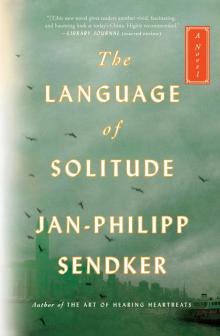 The Language of Solitude
The Language of Solitude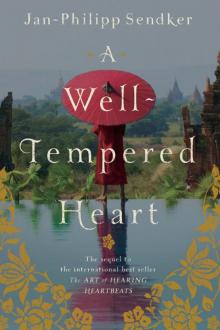 A Well-Tempered Heart
A Well-Tempered Heart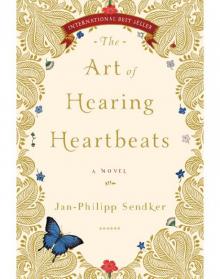 The Art of Hearing Heartbeats
The Art of Hearing Heartbeats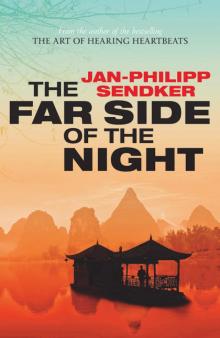 The Far Side of the Night
The Far Side of the Night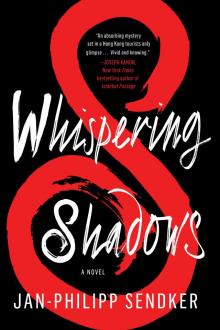 Whispering Shadows
Whispering Shadows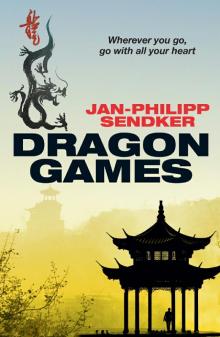 Dragon Games
Dragon Games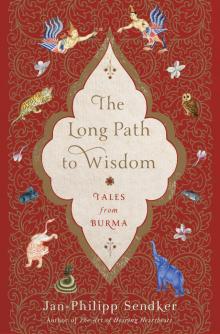 The Long Path to Wisdom
The Long Path to Wisdom